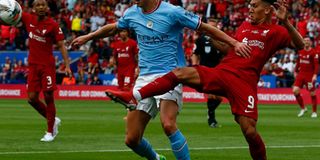Prime
Broadcasters, rights claimants in deadlock

Ugandan radio stations that broadcast EPL matches have hit a dead end with DSL. PHOTO/ COURTESY
What you need to know:
Discovery Sports Limited (DSL), the company claiming rights to audio broadcast of the English Premier League (EPL) matches in Uganda, advised by broadcasters body, Nab, to go back to talkSPORT and clear some ambiguities before talks can proceed
. Local radio stations will continue broadcasting English Premier League (EPL) matches in Uganda uninterrupted until the issue of rights is fully addressed with the reported licencee in the United Kingdom.
This after Discovery Sports Limited (DSL) and the National Association Broadcasters (Nab) in Uganda failed to agree on how to implement anything with reported ambiguities in the rights agreement.
The two entities met on Monday in Kampala, with Nab keen to understand what exactly is entailed in the licence agreement between DSL and EPL's international audio rights holders, talkSPORT.
The meeting was called by Nab after DSL issued multiple notices in the press last week, cautioning radio stations and betting houses against broadcasting EPL matches starting from August 29, unless they had clearance from the said company.
Stalemate
In the meeting, DSL insisted that the agreement with talkSPORT granted them two rights; and that is audio broadcast rights and the produced content by talkSPORT.
They laid their emphasis on clause 2.1 of their agreement to support their case, which "grants the audio broadcast rights of the premier league in the territory to DSL."
However, Nab disagreed with DSL's interpretation as explained below by the broadcasters body legal counsel, Ismail Obadia Otim.
"We submitted our reservations, and emphasized, among others that; DSL's license is limited to Live Audio programmes of up to 10 matches per week produced by talkSPORT, and does apply to any other content produced outside talkSPORT," said Otim.
Ugandan radio stations that broadcast EPL matches do their commentary from watching TV like you do at home, with additional sound effects to bring the stadium feel. In a letter to Nab members after the meeting with DSL, Otim wrote that the binding solution to the final interpretation would be a court of law with competent jurisdiction, but that before that, the following had to be explored.
That DSL would "eequest talkSPORT to write to Nab, copying URSB and UCC, emphasizing and clarifying on the nature of the rights granted to DSL vis-a-vis its effects on Radio Commentary and such related or other rights in the Agreement."
The company was also "to clarify on the vagueness and ambiguity of the agreement.
"DSL (also) stated that it was going to engage and execute an addendum with talkSPORT that emphasizes that, 'the rights and license acquired by DSL includes audio broadcast, licensing live commentary on radio...
"...and that it's not limited to produced audio broadcast or content from talkSPORT ONLY, but the licensing of every content relating to audio broadcast including radio commentaries of the EPL."
Status quo remains
Having said all that, Otim added, "For now, the status quo remains. We await the letter and addendum to decide whether to proceed to court or deliberate on the way forward."
DSL legal counsel, Timothy Kajja corroborated Otim's side of events but without digging in as much on details.
"Nab requested for clarity on some of the clauses and advised that talkSPORT verify our claims to the rights," Kajja told the Daily Monitor on Tuesday.
"So we contacted talkSPORT on Monday evening and they will write to Nab through us and from there, we shall agree with Nab and its members on the way forward."
Central Broadcasting Services (CBS) FM programs manager Abbey Mukiibi last week told this newspaper that as far as he was concerned, they would "continue broadcasting games," because they don't infringe on anyone's rights.




